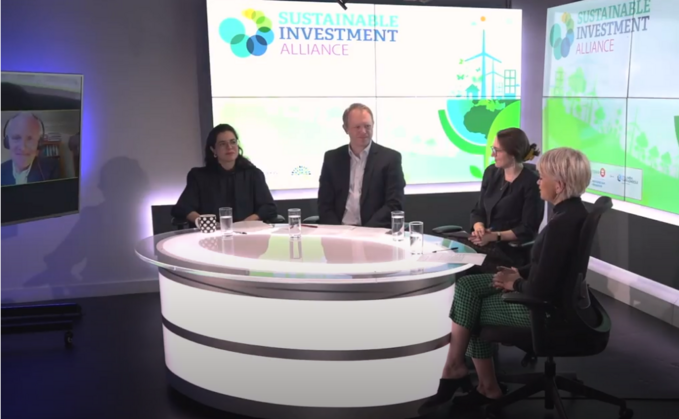
Alice Evans, David Osfield and Simonetta Spavieri
Representatives from Columbia Threadneedle Investments, EdenTree and Royal London Asset Management recently met to discuss how and why investors can and should support the Just Transition, and how it fits in with current world events.
Sharing their views were: Alice Evans, co-head of responsible investment at Columbia Threadneedle Investments; David Osfield, fund manager at EdenTree; and Simonetta Spavieri responsible investment senior engagement analyst at Royal London Asset Management. Also joining us remotely were Ben Palmer, head of responsible investment at Brooks Macdonald and Rory Sullivan, co-founder of Chronos Sustainability.
Born out of trade union movements, the Just Transition is a movement advocating global decarbonisation in a socially just and equitable manner. It's an initiative that has been around since the 2015 Paris Agreement on climate change but it came to prominence at COP24 when the Just Transition Silesia Declaration was signed by 53 governments, with further commitments made at COP26.
We know that the Just Transition is in its simplest form climate action plus social inclusion, but why is it important?
Rory: We cannot deliver the low carbon transition without accounting for social issues. So we have to pay attention to the impact of the transition on jobs, on the cost of energy and on communities.
In 2015, the International Labour Organisation issued its Just Transition guidelines, which broadened the Just Transition from what it was originally conceived of as an issue around workers to one that includes reference to labour standards, social dialogue and the involvement of stakeholders, skills development and social protection. We have seen investors engage with Just Transition over the past few years and further broaden the interpretation of Just Transition. The Climate Action 100 benchmark refers to four distinct groups of stakeholders - employees, businesses and supply chains, customers and communities - all of whom can be or may be affected by the Just Transition.
What progress have you seen?
Simonetta: Progress has been limited but it's been accelerating over the past couple of years. The 2018 yellow vest movement and protest in France, some other protests in Chile - for example in 2019 that were happening during COP and that's why it had to be moved - were really a wakening for policy and for government. They also sparked interest in investors. In 2019 we asked seven energy utilities in the UK, the big six and National grid, to address the social impact of their climate plans. It is the sector that is moving fastest towards net zero and transforming the UK economy with them. We had an early success with SSE; at the AGM we asked their board, please address the social impact of your plans. They published the first Just Transition globally in 2019, so we went back to the other six and said ‘hey, it's possible'. In less than a year, another five had issued Just Transition strategies.
How do you think progress on the Just Transition can be monitored at a firm level?
Ben: From our perspective as fund selectors, it is really beginning to weave its way into how our dialogue is being constructed with the fund managers and the fund houses, particularly around the establishment of net zero pathways and ambitions. Our view is that the concept of the Just Transition and Just Transition planning needs to be integral to those emerging plans. As with all these things, different sectors and different industries will have varying degrees of impact in this space, and potentially the first place to concentrate is the impact on the workforce in carbon-intensive industries and the industries that are heavily reliant on fossil fuels. What also needs to be considered is the emerging green economy and how to make sure new areas are held to the same employment and working standards as the wider economy.
Simonetta: This year the CEO of Royal London Group's bonus is linked to the delivery of climate transition, the net zero reduction of CO2 in our portfolios and also to the delivery of Just Transition engagement.
On a more granular level, how do you take the theory of the Just Transition and apply it to stock selection?
David: We get the question ‘isn't almost every company a transitional opportunity?'. And we push back on that quite strongly. We appraise a company's transitional qualities around a framework of willingness and ability. We're looking for things like approved science-based targets, aligned to the Paris goals, as a realisation of the need to transition. And we look at how companies have aligned their remuneration targets and KPIs in order to reward success in that. And then their ability to transition is probably one of the biggest differentiators, particularly when we're asked about large multi-national oil companies for example.
What investor action do you think is needed to support the Just Transition and how are you incorporating it into your strategies?
Alice: I think it's having that strategy formally out there; that you don't have to wade through and unpick this from deep within HR policies. It's the recognition that Just Transition is the lens they need to apply to their business and to their strategy.
I think something else we can do as shareholders is require the publication of such a strategy. We've seen Marathon Energy in the US - and I think this might be the first we've seen of this type of shareholder proposal - is asking shareholders to vote on requiring the board to produce such a strategy by 2023, which we can then use to measure progress against. I think that disclosure is very important.
Visit https://www.sustainable-investment.com/sustainable-investment-alliance














